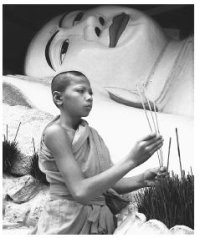INCENSE

Incense (sugandhadhåpa) is a substance that produces fragrant-smelling smoke when burned. In ancient India incense was usually made from extracts of various flowers or from the aromatic gums produced by certain trees. The Buddha often metaphorically equated virtue with a sweet smell. For example, he said: `Of all fragrances Ý sandalwood, tagara, lotus or jasmine Ý the fragrance of virtue is by far the sweetest.' (Dhp.55). And again: `The smell of flowers does not go against the wind but the perfume of the good person pervades all directions.'(Dhp.54). When informed Buddhists light incense and place it before the Buddha statue, they silently reflect on the importance of virtue and resolves to practise the Precepts more faithfully.
In English, sticks of incense are sometimes called `joss sticks.' The word joss is derived from the Portuguese deos meaning `god' and thus to call incense `god sticks' within the Buddhist context is inappropriate.